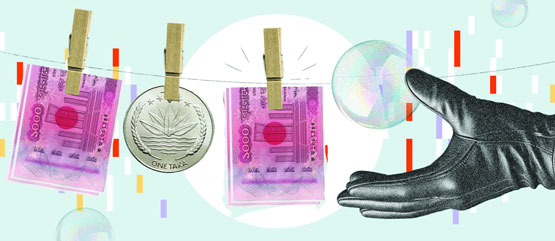Destination of money laundering shifts away from Switzerland
Bangladesh’s Deposits in Swiss Banks Drop by 68 Percent in 2023 Compared to 2022
Special Correspondent: The trend of Bangladeshi citizens depositing money in Swiss banks has seen a significant decline. Recent statistics released by the Swiss National Bank (SNB) reveal that the total amount held by Bangladeshi entities in Swiss banks has drastically decreased. On Thursday, SNB published its 2023 report on the liabilities and assets of banks across the globe, shedding light on the changing financial dynamics. According to the report, by the end of 2023, Bangladesh’s deposits in various Swiss banks stood at 1.77 million Swiss francs. When converted to Bangladeshi currency at a rate of 132 Taka per franc, this amounts to approximately 234 crore Taka. This marks a substantial decrease from the end of 2022, when the amount was 5.52 million Swiss francs, signifying a 68 percent drop.
This downward trend follows a period during which Swiss banks had significant liabilities to Bangladesh. In 2021, the figure was 871.1 million Swiss francs. Analysts believe that the foreign exchange crisis faced by Bangladeshi banks over the past two years has contributed to the reduction in deposits within the Swiss banking system.
By the end of 2022, deposits from Bangladeshi individuals and institutions in Swiss banks amounted to 3.56 million Swiss francs. However, this figure plummeted to 1.40 million francs by the end of last year, translating to around 185 crore Taka. Meanwhile, the amount owed by Bangladeshi banks to Swiss banks also fell, from 1.93 million francs at the end of 2022 to just 3.5 million francs. This amount was notably higher at 84 million francs in 2021.
Conversely, the investment of Bangladeshis in various shares or securities through asset managers has increased. In 2023, such investments amounted to approximately 870,000 francs (around 115 crore Taka), up from 310,000 francs the previous year.
There is speculation that a portion of the funds held in Swiss banks may be laundered money. However, specifics on these illicit activities are scarce, and the identities of depositors remain confidential. The Swiss National Bank aggregates all data to maintain privacy, omitting detailed customer or bank information.
Abu Hena Mohammad Razi Hasan, former deputy governor of Bangladesh Bank and former head of the Bangladesh Financial Intelligence Unit (BFIU), commented on the situation. He noted that Bangladesh primarily engages with Swiss banks for import-export trade. The foreign exchange crisis over the past two years has significantly reduced the foreign currency reserves of Bangladeshi banks. Hasan suggests that those involved in money laundering are now bypassing Swiss banks due to stricter regulations and are instead opting for destinations like Malaysia and the United Arab Emirates, where investing illicit funds in real estate is more feasible. Despite the opportunity for financial intelligence sharing between Bangladesh and Switzerland, no agreement exists to repatriate laundered money.
Discussions with Bangladesh Bank officials reveal that the decrease in foreign currency holdings is not confined to Switzerland but is a global issue. The foreign currency crisis in Bangladesh has led to a reduction in holdings across international banks, exacerbated by pressures from import and debt servicing.
The trend is not unique to Bangladesh. India’s deposits in Swiss banks fell to 103 million francs in 2023, down from 340 million francs in 2022 and 383 million francs in 2021. Similarly, Pakistan’s deposits dropped to 29 million francs from 39 million francs in 2022 and 71 million francs in 2021.
It’s important to note that if Bangladeshi citizens or institutions have deposited money under different national identities, these amounts are not reflected in the statistics for Bangladeshi banks. Additionally, the value of precious assets such as gold or rare materials held in Swiss banks is not included in these figures. Many individuals globally use Swiss bank vaults to store valuables.
Switzerland has been publishing annual banking statistics for several years. The BFIU has had several interactions with its Swiss counterpart, but detailed information about individual account holders has not been disclosed. Switzerland has indicated willingness to provide information if evidence of illegal transfers is presented.
In 2017, then Finance Minister Abul Mal Abdul Muhit informed the National Parliament that the transactions between Bangladesh and Switzerland were not predominantly money laundering cases, though some illicit funds were involved.
Global Financial Integrity (GFI), a Washington-based research and consulting firm, estimates that an average of 64,000 crore Taka is laundered annually from Bangladesh through trade misinvoicing.
The International Consortium of Investigative Journalists (ICIJ) has also exposed several Bangladeshis involved in such activities. The 2013 report named 32 Bangladeshis who opened companies in various countries, known for being tax havens. The 2016 Panama Papers included 56 Bangladeshi names, while subsequent releases (Paradise Papers in 2017 and 2018) continued to reveal more individuals and entities engaged in these practices. Money laundering often aims to evade taxes, conceal illicit gains, hide company profits, and provide better living conditions for families abroad.
This evolving landscape of money laundering requires continuous monitoring and international cooperation to ensure transparency and accountability.
Rare Israeli airstrike in Beirut kills Hezbollah commander and more than a dozen others
International Desk: Israel launched a rare airstrike that killed a senior Hezbollah milita…








